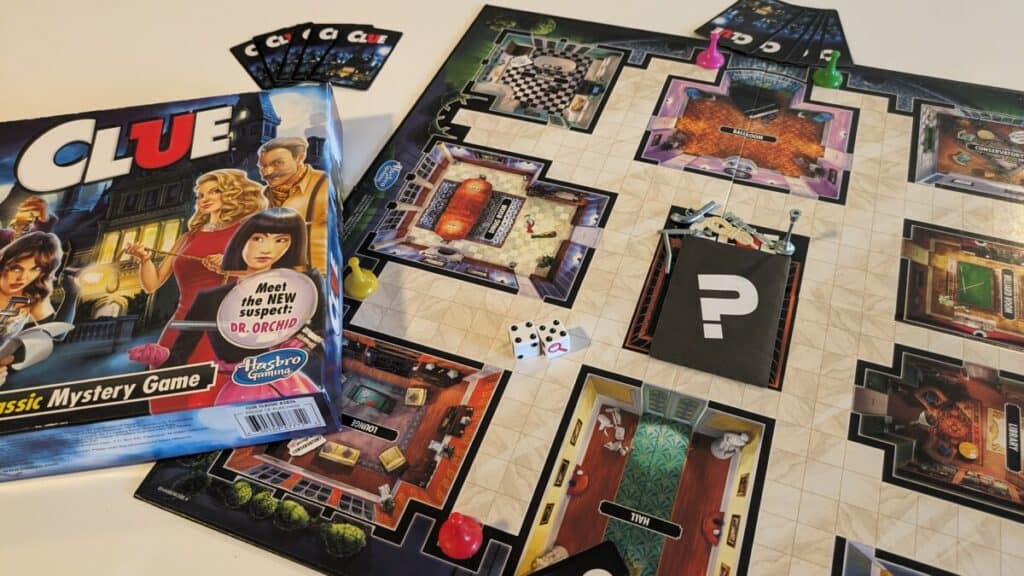
Clue, also known as Cluedo, is a classic murder mystery game in which players use their detective skills and race to figure out who murdered poor Mr. Boddy. I have enjoyed playing Clue since I was a kid, but it wasn’t until I was an adult playing with my family that I finally realized how much of an impact proper strategy has on the game. These Clue strategies are sure to help you win the game almost every time.
In general, the best Clue strategy is to use detailed notation on the entire scoresheet to make logical inferences about what cards each player is holding, allowing you to solve the puzzle very quickly. Additional strategies include bluffing by guessing your own cards and playing as Mrs. Peacock.
I have found that most casual Clue players don’t use all of the tools at their disposal to win the game. By applying the strategies described below you will win much faster and more often than you might have thought possible. Using these strategies might require a mindset shift, but you’ll quickly see how powerful they are.
Organize your data by using the entire scoresheet
The vast majority of Clue players simply use one column on their scoresheet to track cards they’ve eliminated, but this misses out on the most powerful strategy in the game. The most important strategy in Clue is to use the entire scoresheet to create a matrix where you can track all of your data and use it to make inferences about cards other players are holding (or not holding).
Modern versions of Clue come with score sheets like the one shown below. Use a new sheet for every game and set it up as follows:
- Write ‘Me’ or your initials in the first column label
- Write each player’s initials at the top of subsequent columns, one column per player
- Keep the first column free, to be used for the ‘Envelope’ or ‘Solution’
- Check off any cards you have in your hand with a check mark, and an ‘X’ in all other columns
- ‘X’ out the rest of your column, since you don’t have those cards.
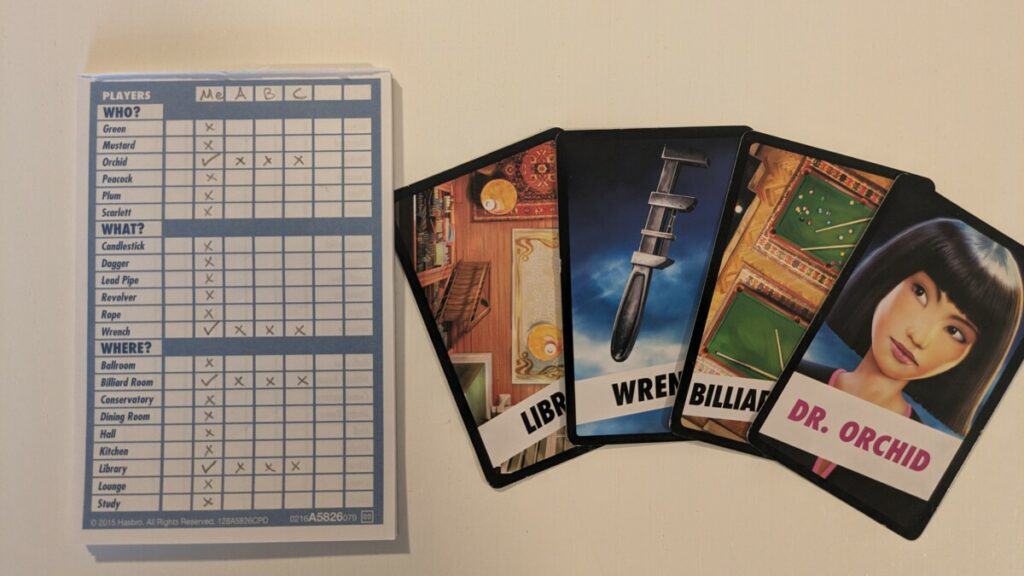
As the game progresses, you will cross off any cards you are shown with an ‘X’, but you will also use this grid to take more detailed notes (keep reading for more on this). Tracking your information this way is much more powerful than simply crossing off cards in a single column because once you gather enough information you will be able to extrapolate and eliminate cards without having to see them.
Gather information on every player’s turn
One of the benefits of using this method is that you can continue to gather information even when it’s not your turn. By paying attention to the guesses and responses of other players you can continue to make meaningful progress on your clues.
For example, if Player A guesses “Professor Plum in the Study with the Rope” and Player B says that they don’t have any of those cards, mark off those three guesses in Player B’s column with an ‘X’ to indicate that those cards aren’t in Player B’s hand. This is powerful, but it doesn’t stop there.
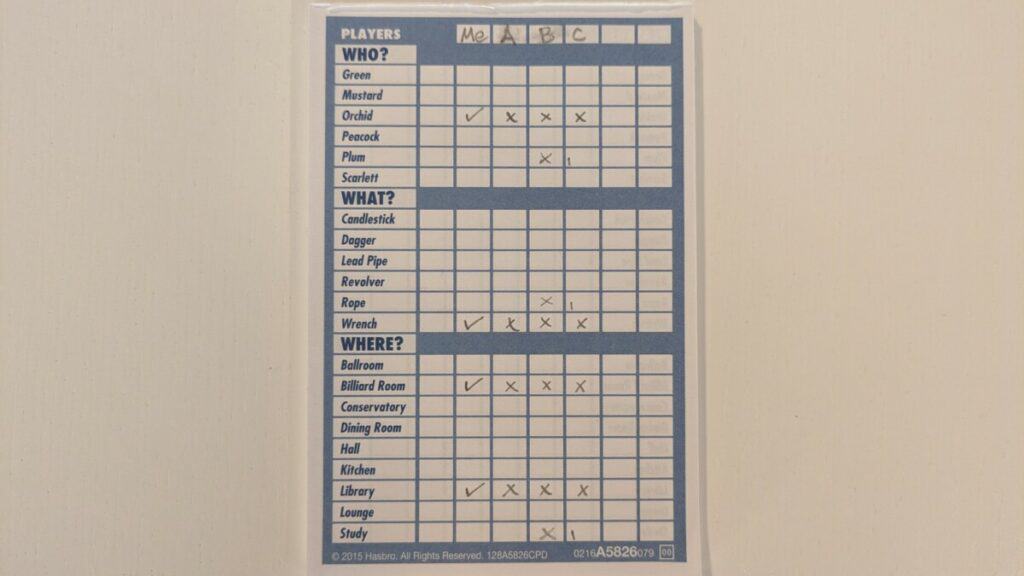
Play continues to Player C, and they show Player A a card. You now know that Player C has one of the cards Player A guessed (Plum, Study, or Rope), but not which specific card. Instead of marking those cards in Player C’s column with an ‘X’, mark them with a 1. This indicates that Player C has at least one of the cards in that guess combination. Then, once two of those cards have been eliminated later in the game you can infer that Player C is holding the other one.
Use consistent notation to make your data clear
Utilizing this method of information tracking is extremely powerful but it does take some practice. Keeping your notation consistent and clear will help prevent you from making mistakes and will make the process much easier to keep up with.
The notation I like to use is:
- Check mark: A player has this card
- ‘X’ mark: A player does not have this card
- Numbers: Consecutive numbers to indicate sets of guesses
- ‘O’ mark: In the envelope column, a card you know is in the envelope
The number system may seem a bit confusing at this point, but it can best be explained with an example. On the card below, I had marked a ‘1’ in Player C’s column for Plum, Rope, and Study because Player C showed a card to another player when that combination was guessed. Later on, I learned that Player C does not have Plum or the Study. Because I made these notations, I can now infer that he must have the Rope, so I put a check mark in that box.
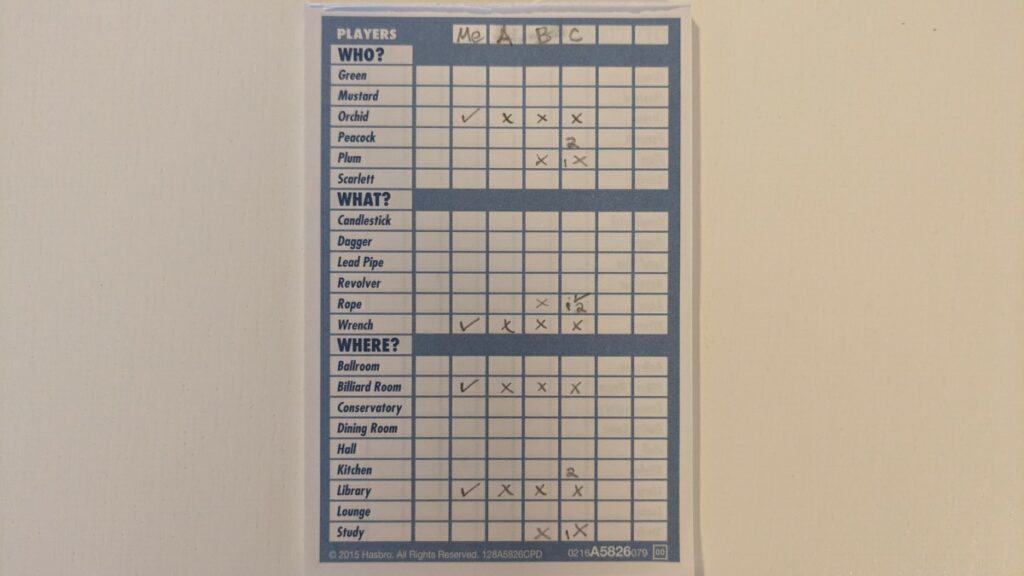
Diligently extrapolate information as it comes
For this overall strategy to be effective, you have to be on top of things as new information comes in. Take time on every turn to see what new information you have learned and see if it leads to any additional information on your scorecard. Sometimes one additional piece of data can snowball into a wealth of information.
Be careful not to rush this process. One incorrect annotation or inference will lead you astray and it will be nearly impossible to recover. You might stumble a few times while practicing this strategy but once you have it down it will be well worth it.
You can use the number of cards each player is holding to make some powerful deductions. If Player A is holding 4 cards and you have X’d out all but 4 of the possibilities in their column then you know exactly which 4 cards he or she is holding. Mark those squares with a check mark and continue extrapolating from there.
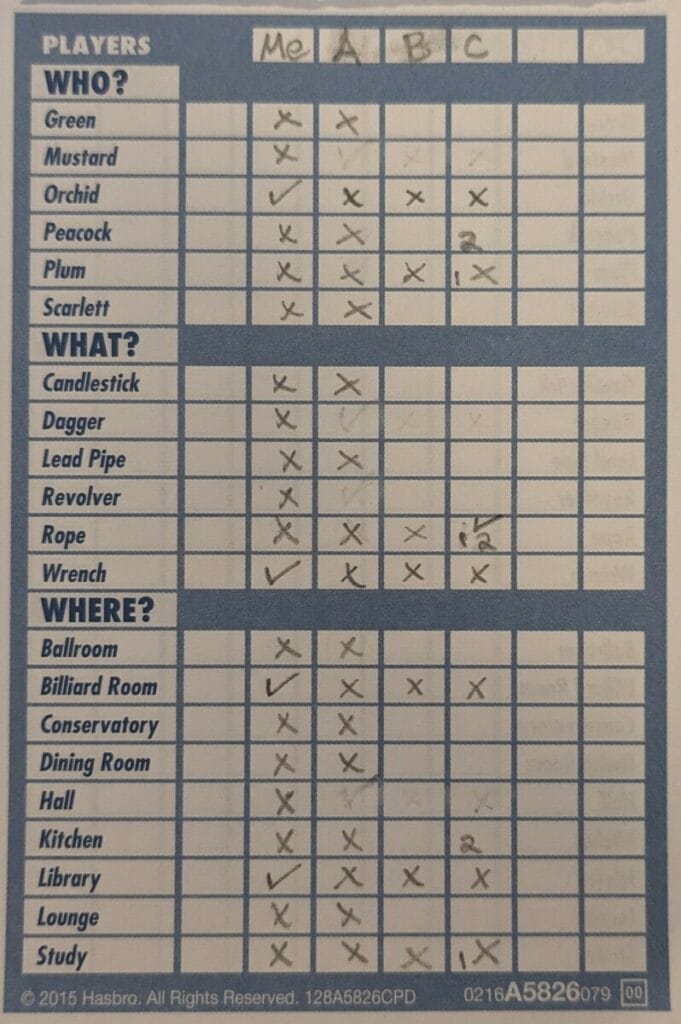
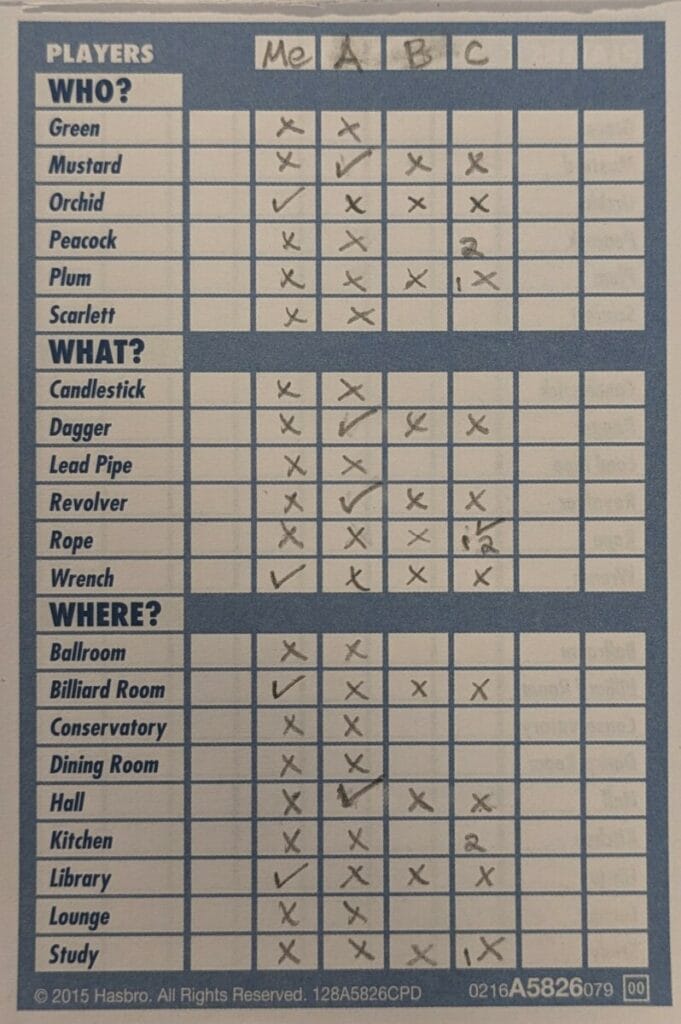
Similarly, if you have already eliminated an entire row and then X’d out all but one square in a different row in that category then you know that the player in that column must be holding that card (see the example below). This doesn’t help us solve the category (since we already know it – in this case, the Study), but it might help us figure out a different clue. Mark it with a check mark and see if that leads you anywhere else.
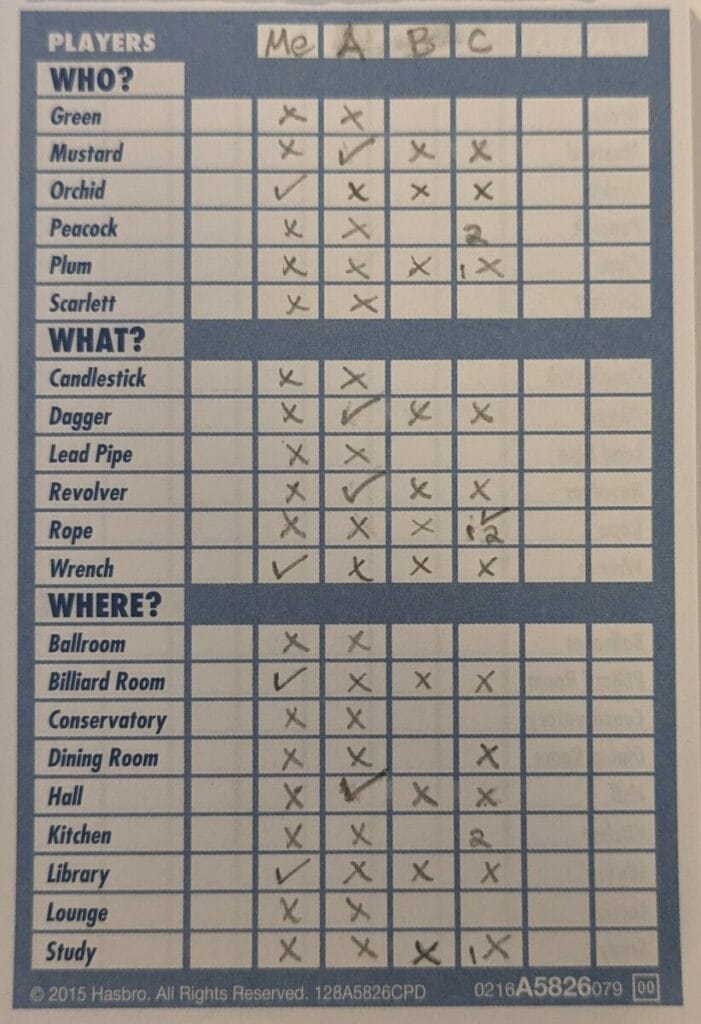
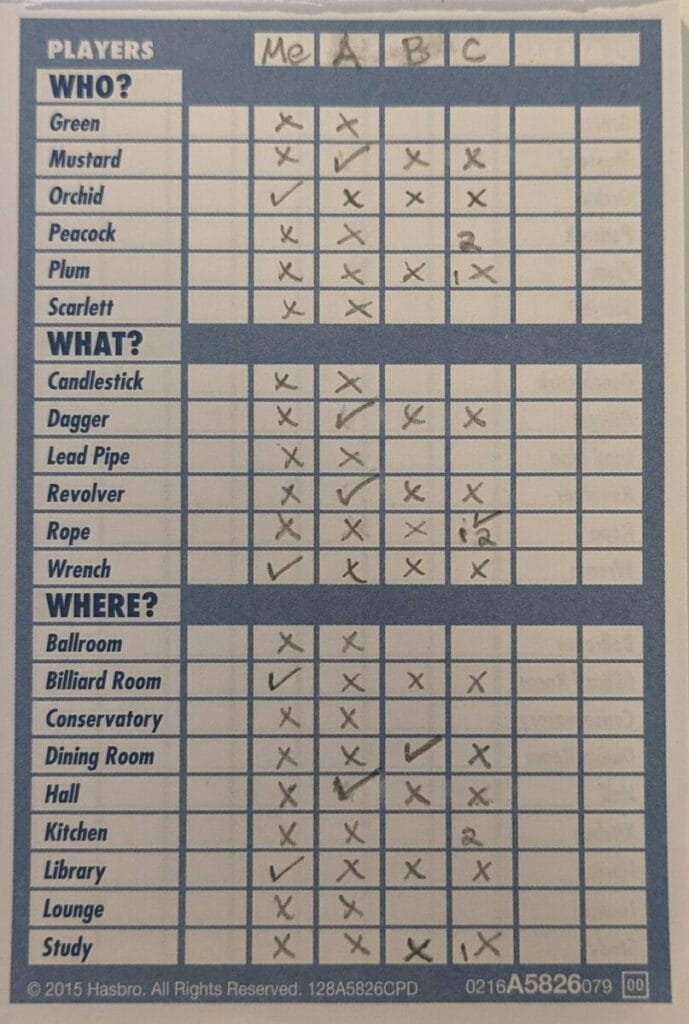
As you cross out squares with number notations in them, double-check to see if you have narrowed down the card that player is holding. For example, if you X out a square with a ‘2’ notation in it, check the other squares in that column that you have marked with a ‘2’. If only one of those squares is not X’d out then you can mark it with a check mark.
Play as Mrs. Peacock for a starting advantage
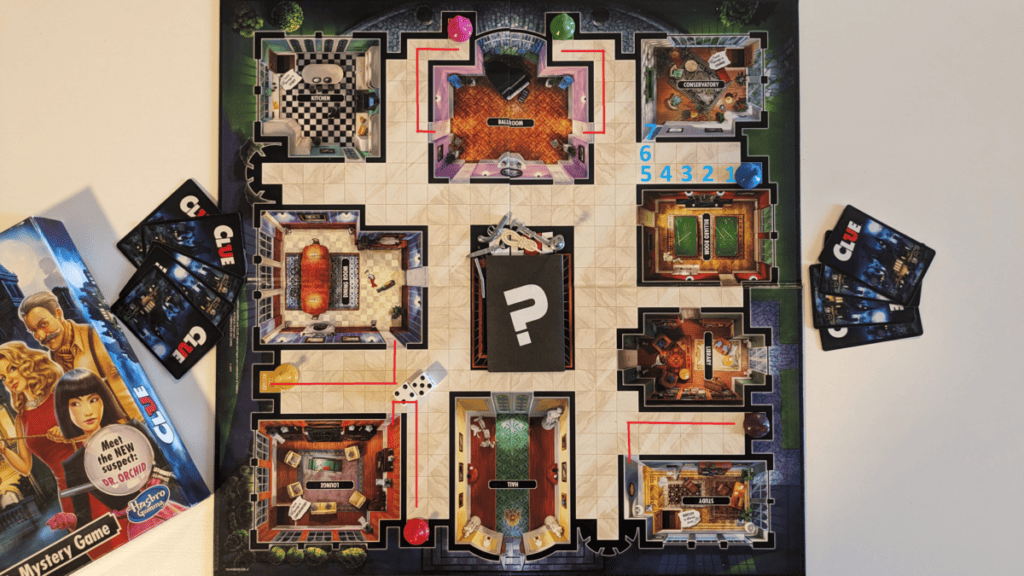
All of the characters in Clue start on the edge of the board in their designated positions. From these starting positions, every character is 8 squares from the closest room with the exception of Mrs. Peacock who is only 7 squares away.
This is a small advantage because you only need to roll a minimum of a 7 on your first turn to reach your first room and make your initial guess. In addition to this, the room you reach is the Conservatory which contains a secret passage. You can use this secret passage to have a guaranteed guess in the Lounge on your next turn.
Make educated guesses before another player wins
If you are confident that another player is going to make their final accusation and win the game on their next turn then your best chance at winning is to make an informed guess before they get the chance. By this time you have likely gathered a lot of information and you’re close to the solution yourself.
CHECK IT OUT: There are a ton of really fun themed variations (links to Amazon) including Harry Potter Clue, Scooby Doo Clue, and Disney Villain Clue. I also really love this Vintage Bookshelf Edition that looks at home on any bookshelf.
For example, if you have already determined that Miss Scarlett committed the crime with the Rope but you still have two possible rooms left, you can make your final accusation with a 50% chance of winning. This is better than letting an opponent make their accusation and letting them win the game.
But you can probably do even better than a 50% chance of winning. If you have made number notations about cards that players could potentially be holding, then in this situation you should choose the room that has the fewest amount of number notations on it because that indicates there is a lower likelihood of that card being in a player’s hand.
Reveal as little information as possible
As the game progresses you will have to give out information to other players but showing them your cards. Try to remember which cards you have already shown to specific players so that you don’t needlessly unveil additional information.
For example, let’s say you have the Library and Candlestick cards in your hand and Player A guesses “Colonel Mustard in the Libary with the Candlestick”. If you have already shown Player A the Library card earlier in the game then you should choose to show it again so that they don’t learn that you have the Candlestick card.
Prioritize information about rooms
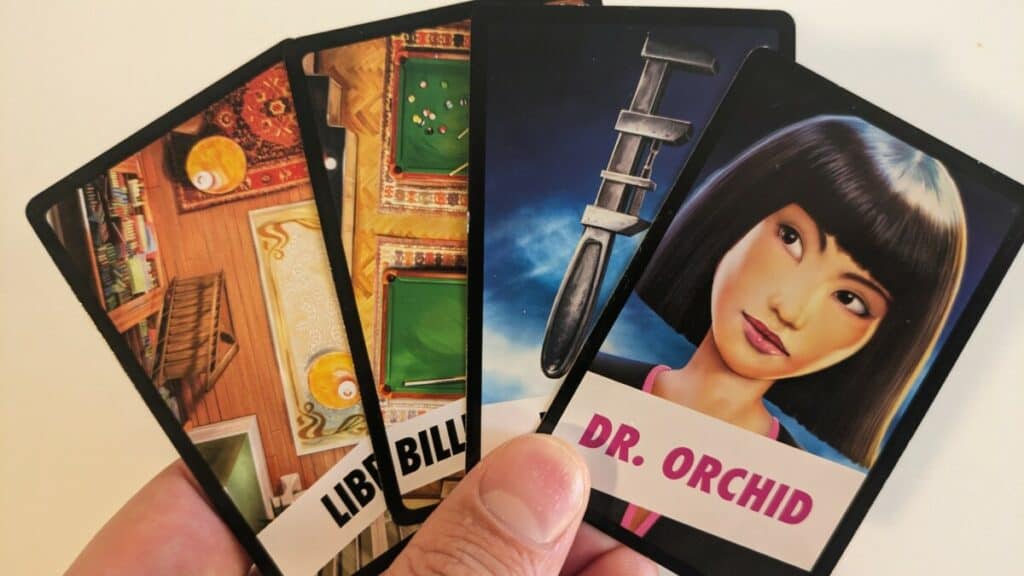
Gathering information about rooms is the most difficult part of Clue. There are 6 suspects and 6 possible murder weapons, but there are 9 rooms to choose from. Not only that, but you have to be in a specific room to guess it. This means that any information about rooms is at a premium.
You should strive to prioritize gathering information about rooms since this is often the last thing players figure out. In that same vein, you should jealously guard any information about rooms that you have. If you have a choice between revealing a Room card or a Suspect/Weapon card, you should reveal the Suspect/Weapon card.
Teleport players who are about to win
In most modern versions of Clue the rules say a player can make their final accusation at the end of their turn after they have made a guess, and they can do it from any room on the board. However, in older versions of the game players are required to be in either the room they intend to accuse or in the center stairwell/pool.
If you are playing with the latter rules, you should be on the lookout for players who are about to make their final accusation. You can pull them away from their desired destination by suggesting them on your turn and teleporting them to your room. This will give you more time to gather additional information and hopefully make your accusation first.
Bluff opponents by asking about your own cards
One of the most powerful and underrated strategies in Clue is to make suggestions using your own cards. This is a great way to gather targeted information about a specific card while also potentially confusing your opponents.
Let’s say you have narrowed things down to two rooms (Kitchen and Hall), and being able to eliminate one of them will allow you to make an accurate accusation and win the game. If you have Mr. Green and the Dagger in your hand, then you should guess “Mr. Green in the Kitchen with the Dagger.”
No players will be able to show you Mr. Green or the Dagger (since you have them) so they will be forced to reveal the Kitchen if they have it. If a player has the Kitchen then you know the Hall is in the envelope, and if they don’t then you know it’s the Kitchen.
Use secret passages when possible
Secret Passages are a great way to ensure that you get to make a guess on your turn. The rules state that you don’t even have to make a dice roll to move through a Secret Passage, you can simply move to the adjoining room and make your next suggestion. By utilizing these passages you avoid risking an unlucky dice roll (or two, or three…) moving between rooms. Losing out on opportunities to make suggestions is a good way to lose!
Sometimes it might even be best to just stay put in a room to continue making guesses. If you already have a lot of information gathered about rooms then it could be more advantageous to guarantee yourself the opportunity to make more suggestions and gather more data.
Block opponents from entering rooms
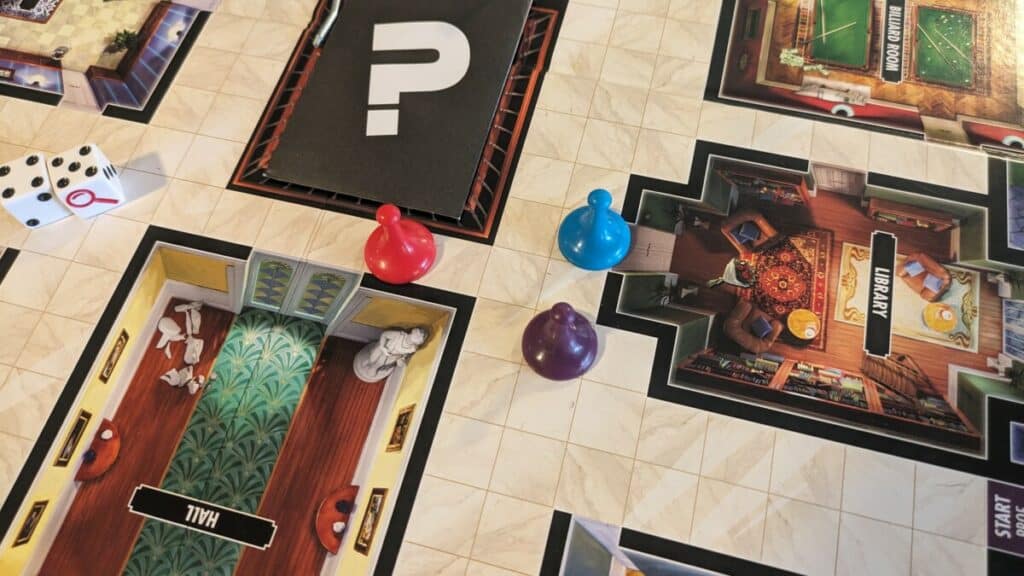
The rules of Clue state that a player cannot land on or pass through an occupied square on the board. This means that it’s possible to block access to a room by standing in front of it, or even to block progress in front of the Hall where the corridor is only 1 square wide.
There are sometimes scenarios where you know where an opponent is trying to get, but allowing them to do so will likely win them the game. You can try to position yourself in such a way as to physically block them from their destination, giving you more time to gather information.
Watch where opponents check off their clues
This strategy is morally gray (at best) so proceed with caution. More than anything else I would suggest that you guard against other players using this little trick against you.
When a player is shown a card and they go to mark their scoresheet, you can get a feel for what part of the sheet they are writing on. You likely won’t be able to tell exactly which square they are marking, but you might be able to tell if they are writing on the top, middle, or bottom part of the sheet. If they’re writing on the top then they’re marking a suspect, the middle is a weapon, and the bottom is a room. You can then mark their guess as if you had been shown the card yourself. Make sure you hide your scoresheet well so this doesn’t happen to you!
Thanks for reading! If I missed something or you have your own opinions, please drop a comment below.
What is thr benefit of along out first in hand? Seems to me like you would never want to assume…
Your strategy comments are excellent, well thought out and very helpful! Thank you
You would only get to draw and play a Sanctuary card on turn two of round one if the Region…
Rule question. If in phase one of round one I play a Region card with a Clue symbol at the…

Leave a Reply